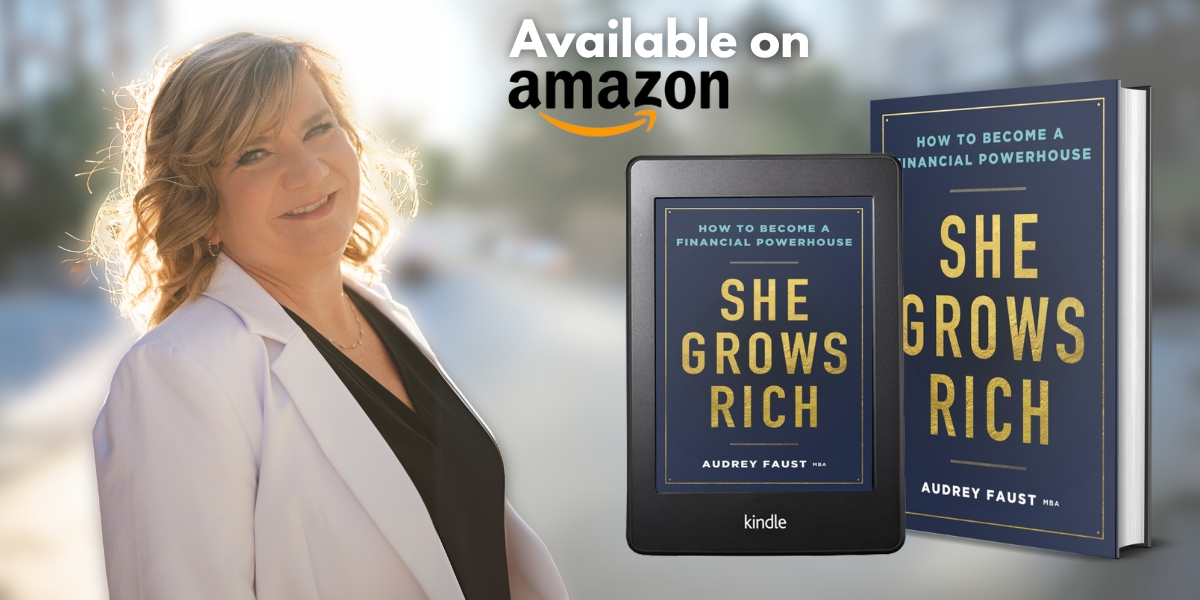By: Dakota Lennin
Audrey Faust’s new book, She Grows Rich, is a thoughtful and inspiring guide aimed at helping women overcome financial barriers, develop a wealth-building mindset, and take actionable steps toward financial independence. Drawing from her own journey of transforming her net worth from zero to multi-six figures, Faust offers practical insights and strategies for women seeking to improve their financial well-being.
The Inspiration Behind She Grows Rich
Faust’s motivation to write She Grows Rich came from the encouragement of friends who saw the value in her story. Initially, she doubted whether her financial journey was unique enough to share. However, upon reflection, she recognized the significant steps she had taken and decided to share her experiences to help other women progress toward financial independence. “I realized it was pretty impressive,” she said, “and that I do get to share it to help women become financially independent.”
Addressing Financial Challenges for Women
Women face unique financial challenges, many of which stem from subconscious beliefs instilled during childhood. These “prosperity blockers” often lead to self-sabotage without women realizing it. Faust’s book identifies these hidden barriers and provides approaches to reprogram them. Additionally, women often feel intimidated by financial concepts, particularly investing. To address this, Faust dedicates an entire chapter to simplifying the fundamentals of investing, making them more accessible regardless of one’s financial background.
A recurring theme in She Grows Rich is the importance of mindset. Faust emphasizes that shifting one’s money mindset can play a pivotal role in achieving financial success. She shares simple techniques to identify and address mindset blocks and incorporates empowering mantras throughout the book to help counteract scarcity thinking. “Mindset is everything,” Faust explains. “When you reprogram your beliefs about money, you may find yourself operating at a completely new level.”
Actionable Strategies for Wealth-Building
Faust’s book is packed with actionable strategies, but one standout is her “7% rule.” This strategy helps readers determine whether to pay off debt or invest their money instead. “I still have debt,” Faust admits, “but none of it is above 7%.” By prioritizing investments over low-interest debt, Faust has grown her wealth over time and encourages readers to consider adopting a similar approach.
Building wealth requires confidence and a strong sense of self-worth, and Faust believes education is key to cultivating these qualities. “Women want to feel educated around building wealth before they dip their toes in,” she says. She Grows Rich aims to provide that education in a straightforward and supportive manner, empowering women to take steps toward greater financial control.
Developing Financial Expertise
Faust’s passion for empowering women financially is rooted in her own experiences. Her journey began years ago when she stumbled upon an article in a magazine about a couple who managed to grow their savings significantly by consistently investing a small amount each month. Inspired, Faust started investing $50 a month and built on this foundation consistently. Her time working at Vanguard further deepened her understanding of the stock market, showing her that financial growth is possible for anyone willing to learn.
One of the most surprising myths Faust discusses in her book is the idea that becoming debt-free should always be a financial priority. “I don’t believe in the debt-free model,” she states. Faust argues that this mindset often stems from scarcity thinking and may hinder long-term wealth-building efforts. Her 7% rule provides a balanced approach, helping readers discern between “good” and “bad” debt and focus on strategies that optimize financial growth over time.
One of Faust’s strengths is her ability to make complex financial concepts more approachable. She believes that financial literacy is a skill anyone can develop with the right resources and mindset. “Once you get over the fear and are open to learning, it becomes easier to start growing your wealth,” she says. Her book breaks down intimidating topics like investing and financial planning into manageable steps that readers can start using right away.
Faust also emphasizes the importance of teaching financial skills to the next generation. She encourages parents to talk openly with their children about money, teaching them how to manage and invest it wisely. For example, she suggests helping teenagers open Roth IRAs as soon as they start earning income. “Encourage your children to start investing early,” she advises. “Talk to them about why saving and investing are important.”
Starting the Journey Toward Financial Independence
For women ready to begin their wealth-building journey, Faust’s advice is simple: start small but start now. “Even if it’s just $50 a month in a mutual fund,” she says. “The only thing you can do wrong is to not start investing.” This emphasis on action—no matter how small—is central to her message in She Grows Rich.
Audrey Faust’s She Grows Rich is more than a financial guide—it’s a call to action for women to take meaningful steps toward their financial futures. By addressing mindset, simplifying financial concepts, and providing actionable strategies, Faust encourages women to work toward lasting wealth and create a legacy of financial independence.
Find She Grows Rich on Amazon Today.
Disclaimer: This content is for informational purposes only and is not intended as financial advice, nor does it replace professional financial advice, investment advice, or any other type of advice. You should seek the advice of a qualified financial advisor or other professional before making any financial decisions.
Published by Tom W.
















